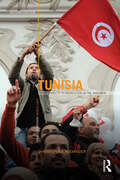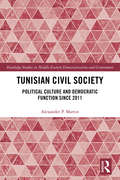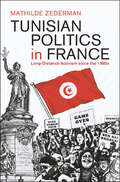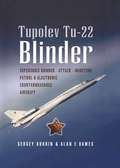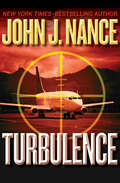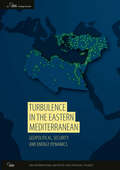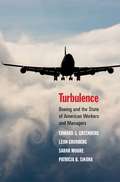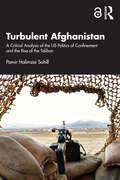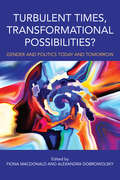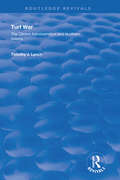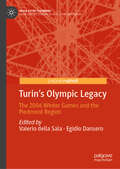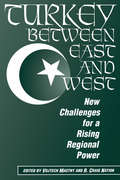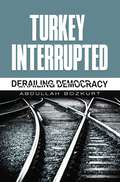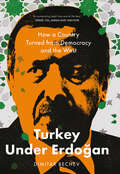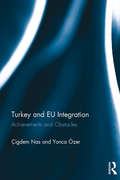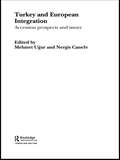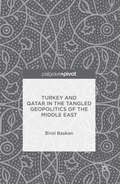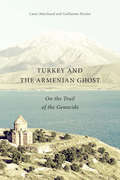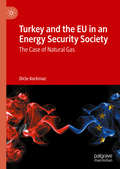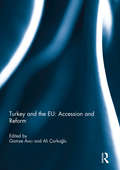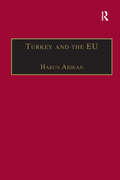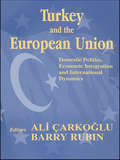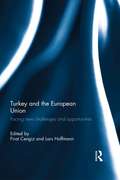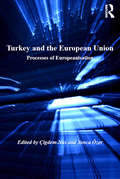- Table View
- List View
Tunisia: From stability to revolution in the Maghreb (The Contemporary Middle East)
by Christopher AlexanderThe first edition of Tunisia was released just nine months before the eruption of the Arab Spring. The most substantial period of political unrest felt by the Arab world in a half century originated in Tunisia, a fact that confounded expectations about Tunisian politics. This new edition builds upon the first edition’s overview of Tunisia’s political and economic development to examine how one of the region’s hardiest authoritarian orders was toppled by a loosely organised protest wave. Providing the most up-to-date introduction to Tunisia’s post-independence and post-Arab Spring politics, concisely written chapters cover topics such as: state formation domestic politics economic development foreign relations colonialism the Arab Spring; its factors and repercussions Key to this new edition is the examination of Tunisian history, politics and society alongside the subsequent upheaval following the outbreak of revolts in December 2010. It looks at how political and economic changes after 2001, including economic deterioration and rising inequality and corruption, had already begun to erode bases of Ben Ali’s government, and explores why Tunisia is the sole Arab Spring country to construct a democracy thus far, and the challenges that this new democracy still faces. An essential inclusion on courses on Middle Eastern politics, African politics, and political science in general, this accessible introduction to Tunisia will also be of interest to anyone wishing to learn more about this significant region.
Tunisian Civil Society: Political Culture and Democratic Function Since 2011 (Routledge Studies in Middle Eastern Democratization and Government)
by Alexander P. MartinInvestigating the political transition after the 2011 Tunisian revolution, this book explores whether civil society is fulfilling its democratic functions. Examining the existence of a civil political culture, that is identified through the presence of the six criteria of Freedom, Equality, Pluralism, Tolerance, Trust, and Transparency. The innovation of the volume lies in its critiques of the “transitology” literature, its illustration of the drawbacks of culturalist and Orientalist narratives of Arab politics, and the complexity it notes with respect to civil society and its varied roles, especially that civil society is not always an unconditionally “good” or democratic force. Using a combination of survey, interview, and observation research approaches, these chapters engage with the development of democratic political culture and democratic knowledge in civil society organisations (CSOs) by understanding how CSOs interact with the state, other CSOs, and their members. Presenting both critical theoretical arguments and extensive empirical evidence to demonstrate why Tunisia is such an important case, this book will be of interest to students and researchers interested in political culture, civil society, and Middle East and North African studies.
Tunisian Politics in France: Long-Distance Activism since the 1980s (Cambridge Middle East Studies)
by Mathilde ZedermanWhat does it mean to oppose or support an authoritarian regime from afar? During the years of Ben Ali's dictatorship in Tunisia between 1987 and 2011, diaspora activism played a key role in the developments of post-independence Tunisian politics. Centring this study on long-distance activism in France, where the majority of leftist and Islamist exile groups took refuge, Mathilde Zederman explores how this activism helps to shed new light on Tunisia's political history. Tunisian Politics in France closely explores the interactions and conflicts between different constellations of pro-regime and oppositional actors in France, examining the dynamics of what the author persuasively describes as a 'trans-state space of mobilisation'. In doing so, Zederman draws attention to the constraints and possibilities of long-distance activism. Utilising material gathered from extensive fieldwork in France and Tunisia, this study considers how the evolution of diaspora activism both challenges and reinforces the boundaries of Tunisian politics.
Tupolev TU-22: Supersonic Bomber—Attack—Maritime Patrol & Electronic Countermeasures Aircraft
by Sergey BurdinThis historic Russian aircraft was first delivered to the Soviet Air Force at the height of the Cold War in 1961. It remained in service until replaced by the much modified Tu-22M Backfire which was introduced in the early 1970s and still remains in service. It was the first Soviet supersonic bomber and was used for reconnaissance and bombing, in the latter role carrying either conventional or nuclear bombs. The early aircraft had a range of 1,800 miles but later models had a much increased radius of action through the introduction of in-flight refuelling. This book looks at the design and development of the aircraft up to the introduction of the type M Backfire. Details of construction, weapon systems, photo-reconnaissance and jamming equipment are included to cover the several variant models. Operational use is explained and the text includes many first-hand accounts from Russian aircrew of the period. The book will be superbly illustrated by unique official photographs and manuals.
Turbulence
by John J. NanceA planeload of enraged passengers declares mutiny when their captain makes an emergency landing in the middle of a war zone in this action-packed thriller from New York Times–bestselling author John J. Nance In a desperate attempt to cut costs, Meridian Airlines has given up on any pretense of customer service. The passengers on Meridian Flight Six from Boston to Cape Town are fed up with hours-long delays, uncomfortable cabin conditions, and rude airline personnel. But Brian Logan is more than a disgruntled passenger: He believes Meridian killed his wife and he&’s about to take revenge by lighting the fuse of disaster. When Capt. Phil Knight makes a forced landing in a hotbed of insurgents in Nigeria, he&’s facing more than a rebel firefight. Violence erupts inside the cabin as Logan leads the passengers in a revolt. But with the loss of radio contact, the civilians don&’t realize that NATO and the CIA believe their plane has been hijacked by terrorists and must be taken down.
Turbulence in the Eastern Mediterranean: Geopolitical, Security and Energy Dynamics
The IISS Strategic Dossier Turbulence in the Eastern Mediterranean: Geopolitical, Security and Energy Dynamics surveys the geopolitical landscape, defence dynamics and energy prospects of the region that spans Cyprus, Egypt, Greece, Israel and the Occupied Palestinian Territories, Lebanon, Libya, Syria and Turkiye. It assesses the security outlook for the region, considering potential flashpoints for intra- and inter-state conflict and evaluating whether newly developed defence ties could evolve into formal alliances. Energy discoveries made in the region in recent years have spurred states’ ambitions to become energy hubs. The dossier evaluates whether such aspirations could lay the foundations for deeper regional cooperation or, conversely, increase the risk of confrontation.The dossier includes both thematic and country-specific chapters. In addition to the countries in the area of study, it explores the involvement of seven external powers – China, the European Union, France, the Gulf Cooperation Council states, NATO, Russia and the United States – and assesses where the opportunities and risks for these actors lie.This volume will be essential for policymakers and business leaders seeking a better understanding of the factors shaping the geopolitics of the Eastern Mediterranean region.
Turbulence: Boeing and the State of American Workers and Managers
by Edward S. GreenbergThis timely book investigates the experiences of employees at all levels of Boeing Commercial Airplanes (BCA) during a ten-year period of dramatic organizational change. As Boeing transformed itself, workers and managers contended with repeated downsizing, shifting corporate culture, new roles for women, outsourcing, mergers, lean production, and rampant technological change. Drawing on a unique blend of quantitative and qualitative research, the authors consider how management strategies affected the well-being of Boeing employees, as well as their attitudes toward their jobs and their company. Boeing employees' experience holds vital lessons for other employees, the leaders of other firms determined to thrive in today's era of inescapable and growing global competition, as well as public officials concerned about the well-being of American workers and companies.
Turbulent Afghanistan: A Critical Analysis of the US Politics of Confinement and the Rise of the Taliban
by Pamir Halimzai SahillThis book explores the what, the why, and the how of the Taliban takeover of Afghanistan almost 20 years after their removal from power. It examines how the U.S. discourses on War on Terror and state-building in Afghanistan have taken shape, became dominant over the past two decades, and to delineate their consequences. Also, it highlights how both discourses are representative of wider depoliticization of the society and eventually paved the way for the illiberal, oppressive politics of confinement and necropolitics. The volume will be of great interest to scholars and researchers of politics and international relations, U.S. foreign policy, peace and conflict studies, area studies, especially West Asian and South Asian studies.
Turbulent Afghanistan: A Critical Analysis of the US Politics of Confinement and the Rise of the Taliban
by Pamir Halimzai SahillThis book explores the what, the why, and the how of the Taliban takeover of Afghanistan almost 20 years after their removal from power. It examines how the U.S. discourses on War on Terror and state-building in Afghanistan have taken shape, became dominant over the past two decades, and to delineate their consequences. Also, it highlights how both discourses are representative of wider depoliticization of the society and eventually paved the way for the illiberal, oppressive politics of confinement and necropolitics.The volume will be of great interest to scholars and researchers of politics and international relations, U.S. foreign policy, peace and conflict studies, area studies, especially West Asian and South Asian studies.
Turbulent Times, Transformational Possibilities?: Gender and Politics Today and Tomorrow
In Canada, and elsewhere, recent political, economic, and social shifts have brought gender to the forefront of politics as never before, from gender-based analyses and "feminist budgets" to the #MeTtoo, Idle No More, and Black Lives Matter movements. Detailing these gendered and turbulent political times, this book features diverse contributors’ state-of-the art scholarship from diverse contributors that encompassesing both contemporary challenges as well as avenues for change now and into the future. This collection represents provides a more complex treatment of both gender and politics, in which : gender is examined in light of other collective identities and their intersections; and politics refers to includes both the institutional political, ands well as movement and countermovement politics.
Turf War: The Clinton Administration and Northern Ireland
by Timothy J. LynchFirst published in 2004, this provocative and remarkable book is the first significant study of how the Clinton administration revolutionized US policy toward Northern Ireland in the 1990s. Based on interviews with the major actors in the episode, Timothy Lynch examines in detail how the internal American turf war fought over Northern Ireland shaped the quality and character of US engagement. Turf War will be essential reading for all those seeking to understand American policy toward Northern Ireland; the institutional dynamics of US foreign policy after the cold war; the perils of locking terrorists into a democratic process; and US interventions more broadly.
Turin's Olympic Legacy: The 2006 Winter Games and the Piedmont Region (Mega Event Planning)
by Egidio Dansero Valerio Della SalaThis book examines the lasting impact of the 2006 Winter Olympics on the city of Turin and the Piedmont region. From urban renewal and pedestrianization to regional transport networks, tourism, and citizen participation, the book highlights the key elements that constitute the enduring Olympic legacy of the Turin Winter Games. It showcases how the city created a new image of itself internationally, transforming Turin from a car-centric industrial hub to a sustainable and vibrant metropolis. Turin was the first Olympic city to pioneer efforts in implementing environmentally, socially, and economically sustainable planning. Bringing together scholars from OMERO, the interdepartmental research center on “Urban and Event Studies” of the University of Turin and from other research centers that have extensively studied the Turin 2006 event, this book offers valuable insights into the long-term impact of hosting the Olympics and the innovative practices that constitute a significant legacy of the Turin Winter Games.
Turkey Between East And West: New Challenges For A Rising Regional Power
by Vojtech MastnyLinked by ethnic and religious affinities to two post-Cold War crisis areas—the former Soviet Union and Yugoslavia—Turkey is positioned to play an influential role in the promotion of regional economic cooperation and in taking new approaches to security. In this book, experts from Turkey, Europe, and the United States address key aspects of Turkey
Turkey Interrupted: Derailing Democracy
by Abdullah BozkurtThis book strives to explain what has happened in Turkey in 2013 and 2014 following the onset of major corruption investigations incriminating people close to the Turkish President, Recep Tayyip Erdogan, including his son Bilal Erdogan, various ministers, and several business people. It shows how veteran police chiefs, previously hailed as heroes and awarded with letters of recognition by Erdogan himself, suddenly turned into villains after they exposed an unprecedented graft network within the Turkish government. The book reveals that the so-called parallel structure, which was invented by Erdogan as part of global conspiracy, is nothing but a slanderous farce used to distort facts, shift blame, and scapegoats for Erdogan's own troubles.
Turkey Under Erdogan: How a Country Turned from Democracy and the West
by Dimitar BechevAn incisive account of Erdoğan&’s Turkey – showing how its troubling transformation may be short-lived Since coming to power in 2002 Recep Tayyip Erdoğan has overseen a radical transformation of Turkey. Once a pillar of the Western alliance, the country has embarked on a militaristic foreign policy, intervening in regional flashpoints from Nagorno-Karabakh to Libya. And its democracy, sustained by the aspiration to join the European Union, has given way to one-man rule. Dimitar Bechev traces the political trajectory of Erdoğan&’s populist regime, from the era of reform and prosperity in the 2000s to the effects of the war in neighboring Syria. In a tale of missed opportunities, Bechev explores how Turkey parted ways with the United States and Europe, embraced Putin&’s Russia and other revisionist powers, and replaced a frail democratic regime with an authoritarian one. Despite this, he argues that Turkey&’s democratic instincts are resilient, its economic ties to Europe are as strong as ever, and Erdoğan will fail to achieve a fully autocratic regime.
Turkey and EU Integration: Achievements and Obstacles
by Çigdem Nas Yonca ÖzerWhat has been achieved regarding Turkey’s efforts at integration to the EU and what obstacles remain to it achieving full membership? Like other developing countries, Turkey displays visible signs of advancement with rapid increases in living standards, greater mobility and the rapid spread of technology. Much of its legislation and political, economic and administrative systems are also now aligned to the EU and this process has undoubtedly contributed to democratization and modernization. At the same time problems in politics and society persist; the Gezi protests, limitations of freedom of expression, frequent occupational accidents in the mining and construction sectors, honour killings and political upheaval which has manifested itself most starkly with the recent coup attempt all call attention to the challenges facing a country in the process of change. Charting the political, legal and economic relations between Turkey and the European Union since 1959 this book explores the relationship through phases such as association, customs union and candidacy. Each chapter covers a particular period in the relations and/or a theme which has both current and overall relevance to the conduct of the relations. In this way, the authors examine the impact of the EU in affecting change, what has been achieved and the obstacles that remain.
Turkey and European Integration: Accession Prospects and Issues (Europe and the Nation State)
by Nergis Canefe Mehmet UğurThis book examines the important issue of Turkey's relationship with Europe. The authors uniquely present the Turkish view of integration within the broad context of the debates on Europeanisation and sovereignty, but with a specific focus on the internal debates and issues in Turkey itself. Key issues considered include populism, economic policy design, nationalism, Islam, human rights, business, public attitudes to Europeanisation and the position of the Turkish polity.
Turkey and Qatar in the Tangled Geopolitics of the Middle East
by Birol BaşkanThis book narrates how Turkey and Qatar have come to forge a mutually special relationship. The book argues that throughout the 2000s Turkey and Qatar had pursued similar foreign policies and aligned their positions on many critical and controversial issues. By doing so, however, they increasingly isolated themselves in the Middle East as states challenging the status quo. The claim made here is that it is this isolation--which became acute in the summer of 2013--that led the two countries to forge much stronger relations.
Turkey and the Armenian Ghost: On the Trail of the Genocide
by Laure Marchand Guillaume Perrier Debbie BlytheThe first genocide of the twentieth century remains unrecognized and unpunished. Turkey continues to deny the slaughter of over a million Ottoman Armenians in 1915 and the following years. What sets the Armenian genocide apart from other mass atrocities is that the country responsible has never officially acknowledged its actions, and no individual has ever been brought to justice. In Turkey and the Armenian Ghost, a translation of the award-winning La Turquie et le fantôme arménien, Laure Marchand and Guillaume Perrier visit historic sites and interview politicians, elderly survivors, descendants, authors, and activists in a quest for the hidden truth. Taking the reader into remote mountain regions, tiny hamlets, and the homes of traumatized victims of a deadly persecution that continues to this day, they reveal little-known aspects of the history and culture of a people who have been rendered invisible in their ancient homeland. Seeking to illuminate complex issues of blame and responsibility, guilt and innocence, the authors discuss the roles played in this drama by the "righteous Turks," the Kurds, the converts, the rebels, and the "leftovers of the sword." They also describe the struggle to have the genocide officially recognized in Turkey, France, and the United States. Arguing that this giant cover-up has had consequences for Turks as well as for Armenians, the authors point to a society sickened by a century of denial. The face of Turkey is gradually changing, however, and a new generation of Turks is beginning to understand what happened and to realize that the ghost of the Armenian genocide must be recognized and laid to rest.
Turkey and the EU in an Energy Security Society: The Case of Natural Gas
by Dicle KorkmazThis book explores Turkey-EU relations in the context of natural gas. Utilising the English School theory and narrative policy analysis, the author examines EU narratives on Turkey’s role in European energy security in the sphere of natural gas, as well as narratives of Turkish actors on natural gas pipelines and the liberalisation of the natural gas market. The book discusses the extent to which the positions held by Turkish actors on natural gas and energy security constrain and/or enable its integration with the EU. Accordingly, it compares the narratives of the EU and Turkish actors to ascertain how references to the content and scope of the integration varied between January 2001 and July 2019. In the context of this book, "integration” does not necessarily mean Turkey’s full membership in the EU. Rather, it refers to different types of relations, which are classified as energy security societies.
Turkey and the EU: Accession and Reform (South European Society and Politics)
by Gamze AvciTurkish accession to the European Union is an important but controversial item on the agenda of the European Union. By focusing on the various domestic sources that drive Turkish politics, this comprehensive study of both classic and new topics supported by fresh, new insights fills a void in the current literature on Turkey-EU relations. This volume is a comprehensive, state of the art study of domestic politics and policies and their role in Turkey’s EU accession. Contributions are obtained from established scholars, acknowledged for their expertise in their respective fields. The content is structured along issues, dynamics, actors and policies that drive Turkish politics and it provides an integrated assessment of the dynamics in Turkey-EU relations to general readers, students and specialists in EU Enlargement and Turkish politics alike. Original contributions to ‘classic’ topics such as the customs union, human rights, military, civil society, public and elite opinion, political parties and the Kurdish issue are made by assessing the domestic sources of recent developments during the negotiations period. In addition, ‘new’ topics are included that previously have not been covered or analyzed in volumes on Turkish-EU relations such as the Alevi issue, European Turks, corruption in Turkey, and Turkish parliamentary elite opinion on Turkey and the EU. This book was published as a special issue of South European Society and Politics.
Turkey and the EU: An Awkward Candidate for EU Membership?
by Harun ArikanThe relationship between Turkey and the European Union is an important issue in European integration. With the EU beginning accession talks with Turkey, this is a vital moment for the future as the EU deals with a central question that has been on the agenda for over forty years: Turkey's membership. Since the first edition, EU-Turkey relations have clearly taken different directions. There have been considerable developments in Greek-Turkish relations, the Cyprus issue, the domestic politics of Turkey including human rights and the protection of minorities, and the changing security environment post-9/11. Furthermore, recent enlargement has been an important turning point for the EU. This extended and revised edition addresses these major developments and assesses the implications of Turkish membership for the current EU structures. The book is a timely addition to the existing literature for students and academics of European and Middle Eastern Studies.
Turkey and the European Union: Domestic Politics, Economic Integration and International Dynamics
by Barry Rubin Ali ÇarkoğluThese papers examine the history behind Turkey's application for EU membership. The contributors tackle the thorny issues of Cyprus, Turkey's attitude towards a common defence policy and Turkish parliamentarians' views on the nation's relations with the European Union.
Turkey and the European Union: Facing New Challenges and Opportunities
by Firat Cengiz and Lars HoffmannIn recent years, Turkey has become an ever more important actor on the international stage. However, Turkey-EU relations still remain in a state of flux. The EU and Turkey seem to have moved apart in their political aspirations after Turkey’s EU accession talks faced a stalemate over the Republic of Cyprus’ EU accession as a divided island. Likewise, both Turkey and the EU have recently faced new socio-political realities, such as the Eurozone crisis, the Arab Spring and the Turkish government’s shifting foreign policy towards the Middle East region. Such developments have rendered EU membership potentially a less desirable prospect for an increasingly self-confident Turkey. In light of these recent events, this book explores the evolving challenges and opportunities facing the more than 50-year old Turkey-EU relationship. This volume focuses particularly on the role of the Cyprus issue, the potential for closer Turkey-EU cooperation in the aftermath of the Arab Spring, the impact on Turkish citizens and politics, as well as the concept of Europeanization, especially in relation to Turkey’s democratic reform process. In drawing together perspectives from the disciplines of international relations, political science and law, this book offers a unique, interdisciplinary outlook towards the changing role of Europe in Turkey’s political discourse. This book will be of interest to researchers and students of Turkey-EU relations, EU external relations Law, Europeanization and Turkish and Middle Eastern politics.
Turkey and the European Union: Processes of Europeanisation
by Yonca ÖzerThe accession of Turkey to the EU presents a fascinating case study for all those with an interest in europeanisation. Officially recognised as a candidate for full membership in 1999 Turkey's negotiations with the EU have been protracted and highly controversial. Turkey and the European Union: Processes of Europeanisation offers a coherent and focussed account of Turkey's recent relations and accession negotiations with the EU. Europeanisation as an explanatory tool is used to review how the EU has successfully induced change in Turkish policies and institutions whilst careful analysis is also conducted into where europeanisation has failed and explores how it may even have inadvertently contributed to forming a backlash against accession. Authoritative local and International contributors provide in-depth analysis as to why the process has had such a varied impact across a range of policies and institutions and ask, given the high costs of joining the EU and decreasing incentives, if europeanisation can still exert an influence in the future. Despite Turkey's unique geographical and political position between East and West the relationship with the EU is not a case sui generis. This book offers valuable insights on the effectiveness of europeanisation for all those within and without the framework of the European Union.
